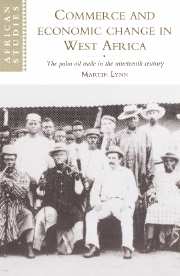Book contents
- Frontmatter
- Contents
- List of maps
- List of tables
- Preface
- List of abbreviations
- Introduction
- Part I The development of the palm oil trade in the first half of the nineteenth century
- 1 The West African trade in transition
- 2 African producers and palm oil production
- 3 African brokers and the growth of the palm oil trade
- 4 British traders, British ports, and the expansion of the palm oil trade
- Part II The restructuring of the palm products trade in the second half of the nineteenth century
- Conclusion
- Notes
- Select bibliography
- Index
- Other books in the series
4 - British traders, British ports, and the expansion of the palm oil trade
Published online by Cambridge University Press: 04 December 2009
- Frontmatter
- Contents
- List of maps
- List of tables
- Preface
- List of abbreviations
- Introduction
- Part I The development of the palm oil trade in the first half of the nineteenth century
- 1 The West African trade in transition
- 2 African producers and palm oil production
- 3 African brokers and the growth of the palm oil trade
- 4 British traders, British ports, and the expansion of the palm oil trade
- Part II The restructuring of the palm products trade in the second half of the nineteenth century
- Conclusion
- Notes
- Select bibliography
- Index
- Other books in the series
Summary
The final link in the passage of palm oil from the oil palm to the processor in Europe was provided by the trader. In the early nineteenth century these were largely British traders, though a number of French and German firms played a significant role in the trade by the middle of the century. The importance of this early generation of traders cannot be exaggerated. Their role in opening a market for palm oil in Britain was crucial for the development of the trade, and yet has largely been ignored in previous studies.
For Britain's African traders, the abolition of the British slave trade in 1807 posed a potential threat. One major British slaving firm, Aspinalls, expressed concern on ‘not knowing how to employ either our time or capital to advantage’ in the face of abolition. More generally it was feared that abolition would leave Liverpool, the leading port of Britain's African trade, devastated. Prophets of doom ‘sprung [sic] up in every street … and the whole [Liverpool] community was terror stricken’, wrote Gomer Williams of the prospect of abolition.
In practice, however, abolition had only a limited impact and any crisis in Liverpool's African trade was short-lived. Drake suggests that ‘continuity and flexibility’ rather than a sharp break marked the experience of abolition for most Liverpool African traders. He sees Liverpool's trade with Africa as characterised by a process of evolution over these years, rather than as two distinct trades, one replacing the other after 1807. ‘There was’, he states, ‘an essential continuity in the African export trade [with Liverpool] of the periods before and after Abolition.’
Drake's argument for continuity in Liverpool's trade carries conviction for Britain's commerce with Africa more broadly.
- Type
- Chapter
- Information
- Commerce and Economic Change in West AfricaThe Palm Oil Trade in the Nineteenth Century, pp. 82 - 102Publisher: Cambridge University PressPrint publication year: 1997

